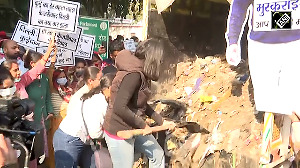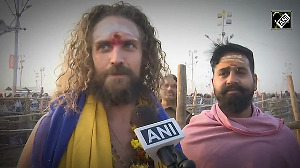A series of desperately close track races on both days were further embellished by J.J. Johnson's anchor leg in the men's 4x100 metres relay to retain the title for the United States on Sunday.
Before the championships began, the International Association of Athletics Federations released a working document stressing the importance of promoting the sport's big names.
The twice Olympic 1,500 metres champion Sebastian Coe, who was elected to the IAAF's ruling council, acclaimed Moroccan Hicham El Guerrouj as probably the best middle-distance runner ever. But, said Coe, his children would not recognise the four-times world 1,500 champion.
Other IAAF members deplored the absence through injury, illness or retirement of some of the great names of the recent past, including triple Olympic champion Marion Jones who took the year off to have a baby.
The ninth world championships did lack the dramatic confrontations of the past, such as Carl Lewis versus Ben Johnson over the 100 in 1987 in Rome or the Lewis-Mike Powell long jump competition in Tokyo four years later.
But it did feature some excellent races, starting with the women's 10,000 on the opening Saturday where Berhane Adere led compatriot Werknesh Kidane across the finish line.
CHANGING OF GUARD
The men's 10,000 on the following day represented a changing of the guard when double world cross country champion Kenenisa Bekele defeated Haile Gebrselassie in a clean sweep for the Ethiopians.
Neither Adere nor Bekele was able to complete the 5,000-10,000 double but the championships proved a success story for one of the world's poorest countries.
Ethiopia finished third in the medals table behind the United States and Russia with three golds, two silvers and two bronzes.
Their African rivals Kenya collected only a silver and a bronze before Sunday's final day when 18-year-old world junior cross country champion Eliud Kipchoge outsprinted El Guerrouj and Bekele to win the 5,000 metres.
Earlier in the day former world record holder Catherine Ndereba won Kenya's first gold in the women's marathon.
The United States resurrected their championships on the final day when Johnson overhauled Britain's Dwain Chambers in the final metres to anchor the Americans to victory.
Wins in the two 4x400 metres relays followed to give the United States a total of 10 golds.
But any championships in which the U.S. do not win the men's 100 gold are regarded as a qualified success only by the Americans.
Defending champion Maurice Greene was injured in the semi-finals and world record holder Tim Montgomery finished out of the medals.
PETULANT
Former American champion Jon Drummond withdrew from the championships after a petulant display following disqualification in the second round of the men's 100 metres.
The title went to Kim Collins of St Kitts and Nevis, whose time of 10.07 equalled the slowest in the 20-year history of the championships.
Kelli White became the first American woman to win the 100-200 double, but she may lose both gold medals this week after testing positive for a stimulant after the 100 final.
The drug, modafinil, is not yet on the banned list but the IAAF is likely to rule that it is sufficiently like present prohibited substances to warrant disqualification under their rules.
White has denied taking any performance-enhancing substances and said she used modafinil to treat a medical condition.
Another embarrassing drugs controversy involving the Americans emerged during the championships when the Los Angeles Times said 400 metres champion Jerome Young had tested positive for the steroid nandrolone in 1999 but had then been cleared to compete in the 2000 Sydney Olympics.
Young denied ever committing a doping offence.
"It was very depressing to see none of our 100 metres guys place in the final," said 400 metres bronze medallist Tyree Washington. "Then seeing Kelli execute in the 100 and 200, then that controversy, it was getting depressing."
But USA Track & Field chief executive Craig Masback remained upbeat about the overall performance.
"It really sets us up for next year," he said. "Ultimately in our world the Olympics are the big thing.








 © 2025
© 2025